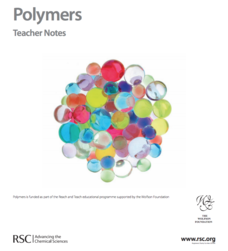Royal Society of Chemistry
Polymers—Gifted and Talented Chemistry
Polymers are an important part of our day-to-day lives, but how much do your pupils know about them? Learn the basics and beyond in a series of activities designed to build skills in observation, planning, organic chemistry, and bonding.
National Institute of Open Schooling
Alcohols, Phenols and Ethers
Classes continue their study of organic compounds in a detailed lesson covering alcohols, phenols, and ethers. Naming these compounds, classifying them, and describing their preparation and use are some of the topics covered. Through...
Earth Day Network
Staying Green While Being Clean
Clean up the environment with a instructional activity that focuses on replacing hazardous cleaning supplies with green, environmentally-friendly products. Using a dirty patch of surface as a control area, kids clean other parts of...
Virginia Department of Education
States of Matter
Scientists have been studying exothermic reactions before they were cool. The lesson begins with a discussion and a demonstration of heat curves. Scholars then determine the heat of fusion of ice and the heat needed to...
National Institute of Open Schooling
Nomenclature and General Principles
Carbon, the base for all organic compounds, exists in nature in its purest form as graphite or diamonds. The 25th lesson in a series of 36 teaches pupils the nomenclature of organic compounds. Learners read about how to use the IUPAC...
Curated OER
The Chemistry of Killer Coal
Young scholars research chemical components of coal, as well as environmental health impacts of mining and burning coal. They discuss conservation of mass as it relates to combustion of organic compounds.
National Institute of Open Schooling
Aldehydes, Ketones and Carboxylic Acids
Although their name makes them sound dangerous or toxic, carboxylic acids are found throughout nature in things such as citric acid, vinegar, and even in your DNA. Through detailed readings, discussions, and answering questions...
Olomana School
Mixtures and Solutions: Paper Chromatography Experiment
Why does some ink bleed through paper, and other ink doesn't? Practice some paper chromatography to separate the colors from a pen with an interactive experiment for middle and high schoolers. Learners use a variety of solutions to track...
Cornell University
Bacteria Take Over and Down
Bacteria outnumber all other forms of life on Earth. Scholars observe the growth of bacteria in petri dishes to understand their role in maintaining good health. Then, they observe the growth of bacteria after they introduce...
Curated OER
Animal Communication
Students understand that all species have some capacity for communication. Students are exposed to the fact that all species have a capacity for communication. They are enlighten to the fact that communication abilities range from very...









